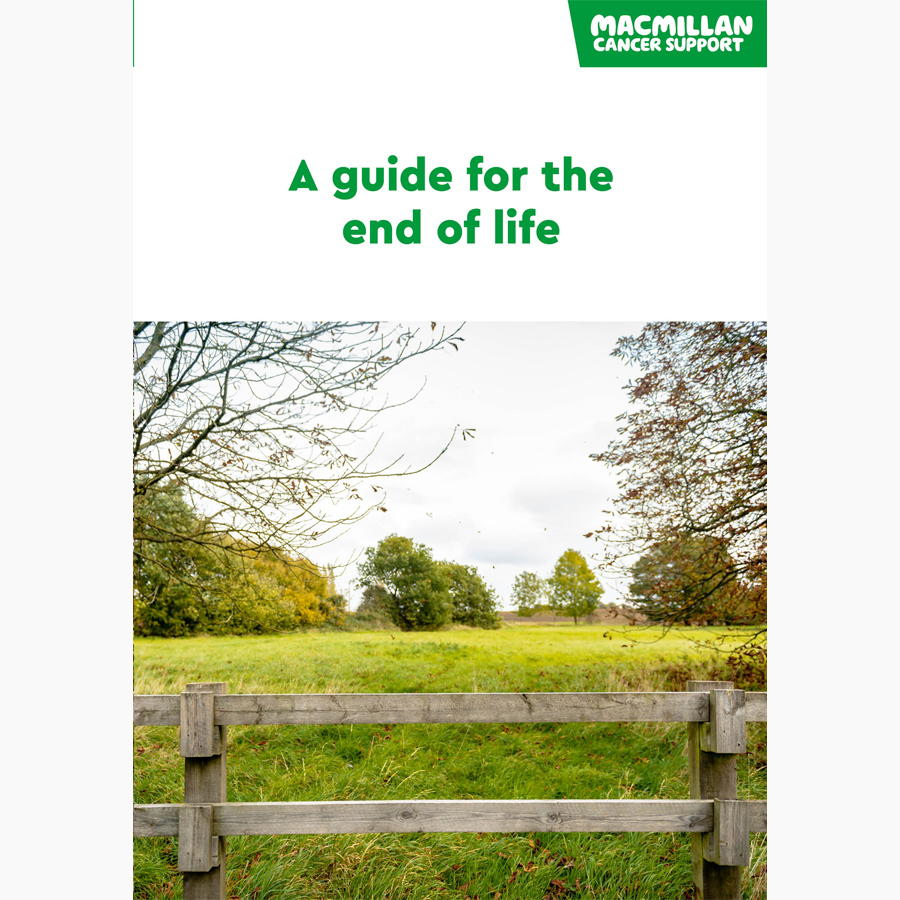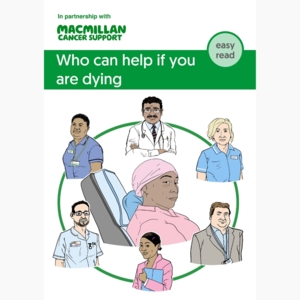Finding out you are near the end of life
There are many practical and emotional issues to work through when you know you are reaching the end of your life.
Coping with the news
Finding out that you are nearing the end of your life can be very difficult and distressing. You might find it hard to believe, even if you know your illness is getting worse. You may have strong and often overwhelming feelings that make it difficult to think clearly.
There is no right or wrong way to feel. Take your time to feel these emotions and ask any questions you need to ask. You may need some time on your own, or with people close to you, to cope with what is happening. You can also talk to your GP, cancer doctor, specialist nurse or social worker for advice and support.
Sometimes it is also useful to talk to someone you do not know. Your family or friends may find this helpful, too. Our cancer support specialists can give you information and emotional support. You can call our support line on 0808 808 00 00 or chat to them online. Or visit our Online Community to talk with other people in a similar situation, share your experience, and ask an expert your questions.
Booklets and resources
Your feelings
You are likely to have many emotions when you find out you may be nearing the end of your life. You may feel tearful and upset, and unsure of how to cope with your feelings. You might feel numb. It may not feel like it is really happening to you.
You may be angry because you feel more could have been done to prevent or treat your illness. It may feel unfair, and you may be anxious about what will happen in the future.
You may have some, or all, of these feelings. But as time passes you may find you feel less distressed. Or you might feel distressed less often. With the right support, you may find you can think more clearly and cope better.
If you find your feelings are difficult to cope with, there are people who can help.
Related pages
Facing an uncertain future
Some people want to know how long they might live. This is known as a prognosis or life expectancy. Others do not want or need to know. Some people may never ask this question.
Your healthcare team may be able to give you an idea of how many weeks or months you might live for. But they cannot be sure. You may live longer than they say or, unfortunately, you may live for less time.
It is common for your mood to go up and down. Sometimes, you may feel well and positive, but at other times you may feel less well and have less energy.
Although your future may be uncertain, it can be helpful to plan ahead and make the most of the days when you feel well. You may want to focus on things you enjoy or want to achieve.
There are some important things you may want to think about before you die. These include:
- where you want to be cared for at the end of life
- making or updating a will
- writing an advance decision or advance directive.
It may be helpful to talk about these with your doctor, nurse and family.
Related pages
People close to you
When you are reaching the end of your life, the people close to you become even more important. But having a terminal illness can affect your relationships.
We have more information about relationships at the end of life.
Talking
Talking about your situation and what is happening can help. But it can be hard, especially if you are feeling unwell. You might feel you have to be strong and support other people, even though you are the one who is ill. Or you may feel like you should be the one to start any difficult conversations.
You may find it helpful to talk through your thoughts and feelings with someone you trust. This may be a close friend, partner or family member. Talking openly about your feelings and what would help can also let them know how to support you. You should only share as much as you want to, and at a time when you feel ready. It may help to plan when you want to talk to someone and what you want to say.
You might find it easier to talk to a healthcare professional. Your GP, specialist nurse or healthcare team at the hospital can support you.
If you are finding it very difficult to cope with your feelings, you may need more specialised emotional support. This could be from a counsellor or psychologist. If you think you may need this, ask your GP or specialist cancer doctor to refer you.
If you live on your own
Living on your own can add extra stress. You may value your independence, but being ill may make you feel lonely and frightened.
People who care about you will want to help in any way they can. It is ok to ask for and accept their help.
Some people may be happy to help in practical ways, such as shopping or helping with your garden. You could make a list of practical things that would make your life easier.
Other people may be able to talk with and listen to you. This could help you to share your worries and fears.
There may be help and support available from health, social care and voluntary organisations. Your GP, social worker, local cancer information centre, or district or community nurse can help you with this.
Emotional support
Approaching the end of your life can be challenging and difficult for you and the people close to you. You may find you get all the emotional support you need from your friends, partner family or healthcare team. Or you may find it helpful to talk to a chaplain or religious leader or to get spiritual or religious support. Some people find it easier to get support from someone they do not know.
You may need more specialised help in dealing with your emotions. This might be from one of the following professionals.
-
Counsellor
Counsellors are trained to listen and help people talk through their situation and the difficulties they face. They will not give advice or answers. But they can help you find your own ways to solve problems. Talking with a trained counsellor can help you express and understand your feelings. It can also help you find ways to deal with these feelings or the problems they relate to.
GP practices, hospitals and hospices often have their own counsellors. Or they should be able to refer you to one. You can talk to one of our cancer support specialists to find out about counselling in your area. The British Association for Counselling and Psychotherapy can also give you details of counsellors in your area.
Your family might also find counselling helpful if they are finding it difficult to cope with their emotions.
-
Psychologist
Some people may find their emotions are too difficult to cope with. Anxiety and depression can cause problems sleeping and make other symptoms such as pain and breathlessness worse. If this happens to you, you may find it helpful to see a clinical psychologist.
Clinical psychologists are experts in understanding how people feel, think and behave. They may be part of the hospital cancer team or the palliative care team. They specialise in providing psychological and emotional support to people. Some psychological services also offer support to carers and family members.
Related pages
About our information
-
References
Below is a sample of the sources used in our advanced cancer information. If you would like more information about the sources we use, please contact us at cancerinformationteam@macmillan.org.uk
Health Improvement Scotland/ NHS Scotland. Scottish Palliative Care Guidelines. Available from www.palliativecareguidelines.scot.nhs.uk/ [accessed Nov 2021].
NICE. Care of dying adults in the last days of life. NICE guideline NG31 [Internet]. 2015. Available from www.nice.org.uk/guidance/NG31 [accessed Nov 2021].
NICE. End of life care for adults: service delivery. NICE guideline NG142 [Internet]. 2019. Available from www.nice.org.uk/guidance/ng142 [accessed Nov 2021].
NICE. Improving supportive and palliative care for adults with cancer. Cancer service guideline CSG4 [Internet]. 2004. Available from www.nice.org.uk/guidance/csg4 [accessed Nov 2021].
-
Reviewers
This information has been written, revised and edited by Macmillan Cancer Support’s Cancer Information Development team. It has been reviewed by expert medical and health professionals and people living with cancer. It has been approved by Senior Medical Editor, Dr Viv Lucas, Consultant in Palliative Medicine.
Our cancer information has been awarded the PIF TICK. Created by the Patient Information Forum, this quality mark shows we meet PIF’s 10 criteria for trustworthy health information.
The language we use
We want everyone affected by cancer to feel our information is written for them.
We want our information to be as clear as possible. To do this, we try to:
- use plain English
- explain medical words
- use short sentences
- use illustrations to explain text
- structure the information clearly
- make sure important points are clear.
We use gender-inclusive language and talk to our readers as ‘you’ so that everyone feels included. Where clinically necessary we use the terms ‘men’ and ‘women’ or ‘male’ and ‘female’. For example, we do so when talking about parts of the body or mentioning statistics or research about who is affected.
You can read more about how we produce our information here.
Date reviewed
This content is currently being reviewed. New information will be coming soon.

Our cancer information meets the PIF TICK quality mark.
This means it is easy to use, up-to-date and based on the latest evidence. Learn more about how we produce our information.





